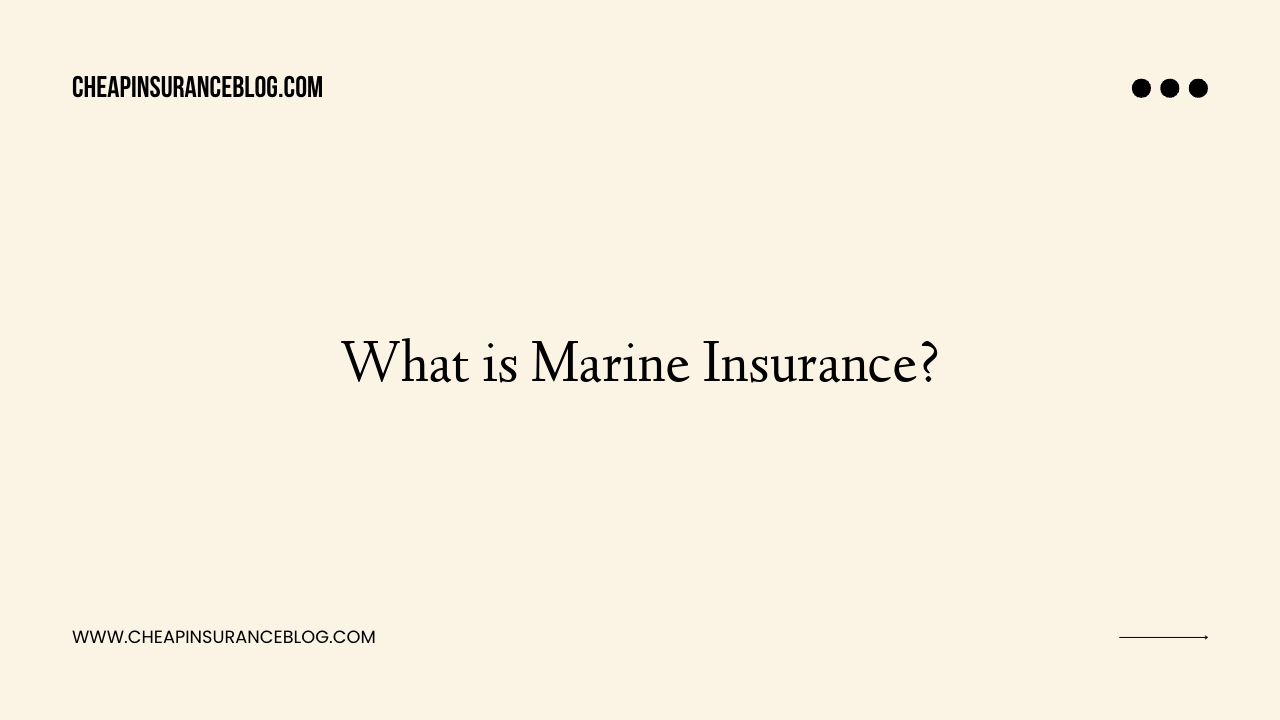Marine Insurance is a specialized form of Insurance that covers shipping, trade, and other marine-related activities. This blog details what marine Insurance is and how it works. Also, here are the features, types, and coverage of Marine Insurance.
What is Marine Insurance
Marine Insurance is a type of Insurance that provides coverage for ships, cargo, and other related interests. It can protect against many risks, including damage to the vessel, loss or damage to cargo, and other perils.
Features of Marine Insurance
There are several key features of marine Insurance that policyholders should be aware of:
Coverage: Marine insurance policies can cover a wide range of risks, including damage to the vessel, loss or damage to cargo, liability for injuries or property damage, and other perils. The specific coverage included in a marine insurance policy will depend on the policy terms.
Exclusions: Marine insurance policies typically include a list of exclusions, which are risks or perils that are not covered under the policy. Common exclusions in marine insurance policies include war, nuclear accidents, and intentional acts.
Deductibles: A deductible is an amount the policyholder is responsible for paying before the insurance company covers the remaining costs. Marine insurance policies may have deductibles for certain types of claims or coverage.
Valuation: Marine insurance policies typically specify how they will determine the value of the vessel or cargo insured in case of a claim. This may be based on the item’s actual cash value or its replacement value at the time of the loss.
Premiums: The premium for a marine insurance policy is the amount the policyholder pays to the insurance company in exchange for coverage. Premiums are typically based on the value of the vessel or cargo insured and the risk level involved.
Claims process: Marine insurance policies typically outline the process for claiming the event of a loss. Include requirements for providing documentation, such as receipts or proof of ownership, and submitting a claim within a certain timeframe.
Types of Marine Insurance
There are several types of marine Insurance available, including:
Hull insurance: Hull insurance covers damage to the vessel itself, including the hull, superstructure, and machinery. It is typically required by lenders or by law in certain cases or when used for commercial purposes.
Cargo insurance covers the loss or damage of goods transported by sea. This type of Insurance is often used by manufacturers, shippers, and other businesses that rely on shipping goods by sea.
Liability insurance: Liability insurance covers the policyholder’s legal liability for injuries or damage caused to others. This may include liability for pollution or oil spills, as well as liability for personal injury or property damage.
Freight insurance: Freight insurance covers the cost of transporting goods by sea. It may use this type of Insurance to protect against the loss or damage of goods during transport, as well as against delays or other unforeseen events that may impact the shipping process.
Marine builder’s risk insurance: Marine builder’s risk insurance provides coverage for damage to a vessel during construction. This type of Insurance is often used by shipbuilders and other parties involved in the construction of vessels.
Marine war risk insurance: Marine war risk insurance provides coverage for losses or damages resulting from war, acts of war, or other related perils. Lenders or other parties often require this type of Insurance when a vessel is used in a high-risk area.
Importance of Marine Insurance
Marine Insurance is important because it provides financial protection against a wide range of risks associated with shipping and transportation by sea. These risks can include damage to the vessel, loss, or cargo damage. It also includes liability for injuries or property damage and other perils.
Marine Insurance can help mitigate these losses and provide peace of mind by covering the costs associated with repairing or replacing a vessel. It also includes reimbursing the value of the lost or damaged cargo and covering liability expenses.
Coverage of Marine Insurance
Marine insurance policies cover a wide range of risks associated with shipping and transportation by sea. The specific coverage included in a marine insurance policy will depend on the policy terms, but common types of coverage include:
Damage to the vessel: Marine insurance policies may provide coverage for damage to the vessel itself, including the hull, superstructure, and machinery. This may include coverage for repairs or replacement of damaged parts.
Loss or damage of cargo: Marine insurance policies may cover the loss or damage of goods transported by sea.
Liability: Marine insurance policies may cover the policyholder’s legal liability for injuries or damage caused to others. This may include liability for pollution or oil spills, as well as liability for personal injury or property damage.
Freight: Marine insurance policies may cover the cost of transporting goods by sea, including the voyage cost and any additional expenses associated with delays or other unforeseen events.
Salvage: Marine insurance policies may provide coverage for the costs associated with salvaging a vessel or its cargo in the event of a loss.
War risk: Some marine insurance policies may cover losses or damages resulting from war, acts of war, or other related perils.
In addition to these types of coverage, including coverage for other risks or perils, depending on the policy terms.
What is not covered by marine Insurance?
Marine Insurance typically covers physical damage to or loss of a vessel, its cargo, or other marine-related property. However, it doesn’t cover war-related perils, nuclear risks, or loss of market, including wear and tear.
